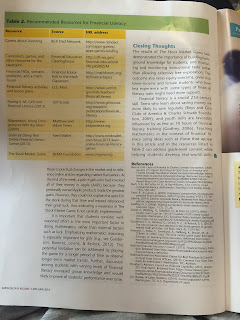In my family, we are constantly sharing silly memes, fun articles, or short tidbits about something we heard that day in our family "Listserv" (yes, my family has a listserv... and it's hilarious). About a week ago my sister, who is getting her masters in Foreign Language Education at Washington University in St. Louis, sent me an article that she claimed I "HAD to read" because it would "change the way I teach math some day." This article titled "Teaching Middle Grades Math Through Financial Literacy" explores the multiple benefits of incorporating "financial literacy" skills with the middle school math curriculum. This article directly aligned with chapter 3 of Subjects Matter which addresses the importance of mixing up our students' reading material; adding in things like personal finance articles can do just that! Students are reading something other than their textbook (which in a math class, is a break that is definitely needed), practicing math skills that follow state standards as well as Common Core standards, and also learning supplementary financial literacy skills that will help them later on in their adult lives.
(word count: 297)
http://www.tandfonline.com/doi/abs/10.1080/00228958.2016.1156526?journalCode=ukdr20





This comment has been removed by the author.
ReplyDeleteI love this post! I love how someone made an article about teaching middle schoolers finance vocabulary because my undergrad degree is in finance; I love how you have a "Listserve" with your family! Math concepts should be related to real life situations in my opinion. It makes the students understand the real importance of math. Not only will students use this knowledge, but also it will give them something else to read besides a boring and concept filled textbook. I just don't have the words to express my love for the article and your post!
Deleteword count: 96
A family listserv! That is too adorable. And such a great idea. Regarding your blog, I think linking math instruction to financial literacy is SUCH A GOOD IDEA. I mean, how many times have students complained that math is useless to them? Problem solved. Teaching financial literacy might also help the economy in the long term if people were able to manage money--especially debt--more effectively. Using financial literacy as the backbone for math instruction would also create lots of opportunities for content-area reading, as there is no shortage of articles, videos, and podcasts talking about money. Great ideas, Sarah! Thanks.
ReplyDelete